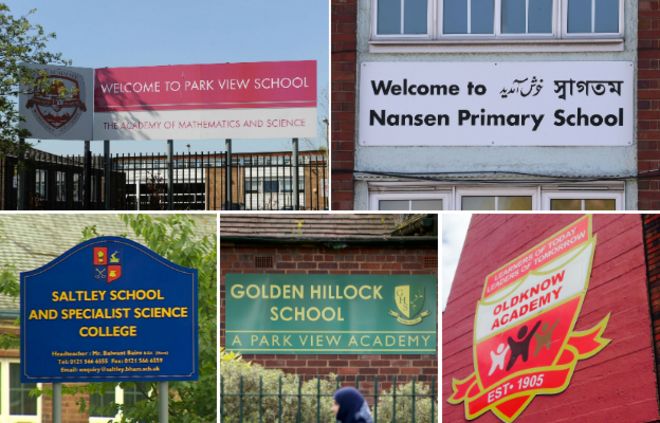
Birmingham’s education commissioner says he has banned the use of the term “Trojan Horse” to describe alleged attempts by groups to take over schools and covertly impose a Muslim ethos.
Sir Mike Tomlinson, appointed in the wake of the controversy, says the phrase was “not helpful” to attempts to improve Birmingham’s schools.
He said that it could have an adverse impact on teacher recruitment.
Sir Mike said no-one in his department was now allowed to use the phrase.
The so-called Trojan horse inquiries followed the sending of an anonymous letter claiming that there was a conspiracy among a group of Muslim parents, teachers and governors to wrest control of several schools in the city.
It gave its name to a long-running and high-profile scandal, which became a major issue for the education secretary and the leader of Ofsted.
The authenticity of the letter has never been established, but Sir Mike said he believes it accurately reflected events that had taken place in schools.
Trojan Horses
- The term was initially applied to the hollow wooden horse in which, according to tradition, Greek invaders concealed themselves in order to enter the walled city of Troy.
- In recent years, the term has been used to describe a computer malaware, disguised as legitimate software, that enables hackers to gain access to users’ sensitive data.
- The letter which initially highlighted the alleged plan in Birmingham described it as “Operation Trojan Horse” and the term was immediately taken up by journalists reporting the story and its aftermath.
Speaking at the Global Education and Skills Forum, Sir Mike said that staff who opposed such “infiltration” were “targeted, bullied and harassed until they resigned”.
The letter prompted a series of investigations by the Department for Education, Ofsted and the local authority.
In the wake of these inquiries, the need for schools to promote “British values” was introduced and Sir Mike’s current role, overseeing schools in the city, was created.
But Sir Mike, a former Ofsted chief inspector, said that the term Trojan Horse was now no longer acceptable and was seen as damaging the image of the city’s schools.
The claims had only related to 21 out of more than 430 schools in Birmingham.
Although believing that there had been co-ordinated attempts to change the character of schools, he said the investigations had found no evidence of extremism or that any young person had been radicalised.
The problems facing Birmingham’s schools could happen in other cities, he said.
“The events were unprecedented but not impossible to happen elsewhere,” he said.
Sir Mike said that in response to the controversy there had been improvements to whistleblowing arrangements and staff training and greater scrutiny of the role of governors.
“Young people are now undoubtedly safer,” he said.
[SOURCE :-bbc]

